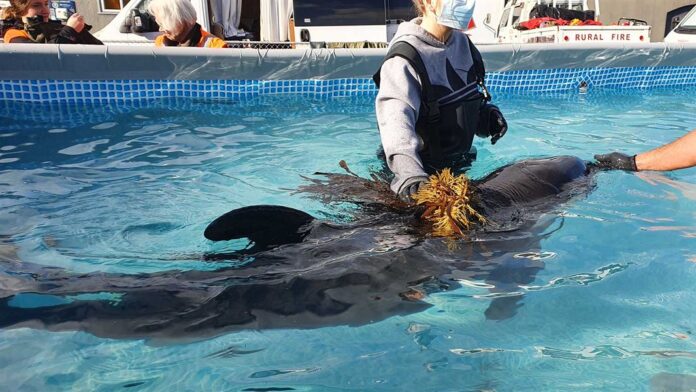Source: Department of Conservation
Date: 20 July 2021
“We continue to monitor the health of the orca calf and it remains in a stable condition,” says Ian Angus, Department of Conservation (DOC) Marine Species Manager.
“We’re very conscious the length of time the calf has been in our care, away from its pod and mother, is now over a week. That’s not ideal for such a young wild animal.
“Tonight the orca will remain in the temporary holding pool, but we will review options tomorrow morning, factoring in weather conditions, any health warnings about the seawater in the harbour, and the calf’s welfare.
“The health and welfare of the calf are central to our decision making.”
Access to the site remains restricted to reduce stress for the orca calf.
International experts that DOC has been consulting with now believe the calf may be between 2–6 months of age, rather than 4–6 months as had been originally suspected. The age of the orca calf naturally determines how long the calf needs care and feeding.
Last Sunday (11 July), the orca calf was stranded on rocks near Plimmerton, north of Wellington. An ongoing operation to care for the orca calf is being led by DOC with support from Orca Research Trust/Whale Rescue Trust, local iwi Ngāti Toa Rangatira, and the local community.
DOC, veterinarians and Whale Rescue/Orca Research Trust are receiving regular advice from international orca experts and veterinarians – information proving vital as decisions are made.
Updates on the stranded juvenile orca in Porirua
View all updates on the stranded orca
Report orca pod sightings
Anyone who sights orca pods off the lower North Island’s west coast – particularly between Wellington and Taranaki – is urged to provide as much information as possible to DOC, via marinemammals@doc.govt.nz or by calling 0800 DOC HOT (0800 362 468).
Essential information includes location of the pod, direction of travel of the animals, and photographs or videos which clearly show the saddle/back markings of the animals and their dorsal fins.
Contact
For media enquiries contact:
Email: media@doc.govt.nz



